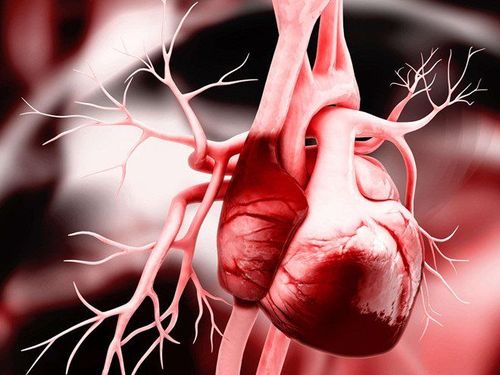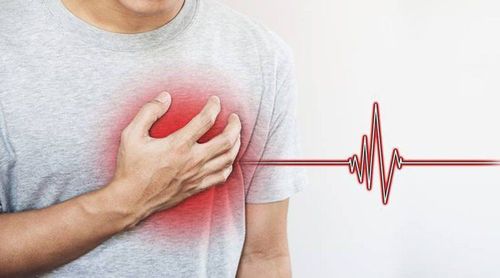This is an automatically translated article.
The article is professionally consulted by Master, Doctor La Thi Thuy - Cardiovascular Center - Vinmec Central Park International General Hospital.
When the pumping function of the heart is impaired, accompanied by an ejection fraction EF less than 40%, it is called systolic heart failure. Heart failure examination and treatment of systolic heart failure require strict adherence to the doctor's instructions to limit dangerous complications.
1. Definition of systolic heart failure
Heart failure is a complex clinical syndrome, with increased mortality, morbidity and hospitalization. Heart failure can be caused by physical damage or dysfunction of the heart that makes the ventricles unable to take in blood (diastolic heart failure) or eject blood (systolic heart failure). Systolic heart failure has a poor outcome despite remarkable improvements in treatment. A clinical standard is needed to develop a standard and accurate diagnostic protocol and treatment strategy to provide better clinical improvement in patients with systolic heart failure.To date, clinical studies of the efficacy of new treatments have only been demonstrated in patients with reduced EF ejection fraction. Patients with heart failure have clinical manifestations: dyspnea, fatigue, reduced exercise capacity, peripheral fluid retention and/or peripheral edema.
2. Causes of systolic heart failure
Finding the cause of heart failure plays a very important role, because thanks to that, doctors will decide on the appropriate treatment. Causes of systolic heart failure are divided into 2 groups, including: underlying causes and precipitating causes.2.1. Background Causes These are the basic causes leading to systolic heart failure syndrome, including:
Coronary artery disease : Myocardial infarction and myocardial ischemia; Chronic pressure overload: Hypertension and obstructive valvular disease; Chronic volume overload: valvular disease causing regurgitation, intracardiac (left to right) or extracardiac outflow; Dilated cardiomyopathy (not related to ischemia): Hereditary or familial disorder, infiltrative disorder, drug or toxic injury, metabolic disease, virus or other infectious agent. .. Arrhythmia and heart rate: Chronic fast or slow; Pulmonary heart disease: Congestive heart failure and pulmonary vascular disease; High supply conditions; Metabolic disorders: Hyperthyroidism or nutritional disorders (eg, Beriberi) Excessive blood flow needs: Systemic arteriovenous flow and chronic anemia. 2.2. Predisposing factors Predisposing factors, also known as factors that aggravate systolic heart failure, include:
Improper reduction of heart failure medication. Cardiovascular diseases, including: Myocardial infarction, myocardial ischemia, tachycardia / bradycardia, acute valvular regurgitation... Infection, anemia, elevated or uncontrolled blood pressure . Effects of some drugs such as: Calcium channel blockers Verapamil and Diltiazem, Beta-blockers, non-steroidal anti-inflammatory drugs or class I and class III antiarrhythmic drugs. The patient drinks a lot of alcohol or is pregnant.

Bia rượu có thể khiến tình trạng suy tim tâm thu nặng thêm
3. Heart failure grading
3.1. Based on functional symptoms and exercise capacity, the New York Heart Association (NYHA) has classified heart failure into 4 grades as follows:Grade I : No limitation of normal physical activity, the patient not often tired, short of breath or nervous. Grade II: Slight limitation of physical activity. Patients are fine at rest, but with normal physical activity will experience fatigue, palpitations, shortness of breath, or chest pain. Grade III: Limited physical activity. Although the patient is well at rest, only mild exercise has symptoms like grade II. Grade IV: Symptoms of fatigue, palpitations, shortness of breath or chest pain occur immediately at rest, any physical activity increases the level. 3.2. In addition, systolic heart failure is also divided into 4 stages from at risk of heart failure to true heart failure, namely:
Stage A : High risk of heart failure but no real heart disease damage or symptoms of heart failure. Stage B: There is actual heart disease but no symptoms of heart failure. Stage C: Has structural heart disease, current or history of symptoms of heart failure. Stage D: Resistant heart failure, requiring special intervention. Based on the degree of heart failure according to each patient's stage, doctors will have different treatment measures.

Suy tim tâm thu chia làm 4 giai đoạn: A, B, C và D
4. Diagnosis of systolic heart failure at Vinmec Times City
According to the recommendations of the European Society of Cardiology 2012, there are 3 criteria to define systolic heart failure:Functional symptoms; Physical symptoms; Decreased ejection fraction EF. When choosing the Heart Failure Package at Vinmec International General Hospital, the patient will be determined the heart failure status, the degree of heart failure, the cause of the heart failure as well as the associated diseases. In particular, the group of subjects who have no symptoms of heart failure but are in middle age (from 45 to 50 years old) should be screened for cardiovascular disease every year, especially smokers, who regularly drink alcohol. drink a lot or are obese.
Details of a heart failure examination package at Vinmec include: Cardiology specialist examination, 24-hour total analysis of blood and urine cells by an automatic counter, quantification and measurement of the activity of some substances in the body, electrocardiogram and electrocardiogram, echocardiography (conventional and stress), and chest x-ray, ...
Master. Dr. La Thi Thuy is currently an interventional cardiologist at Vinmec Central Park International General Hospital. Graduated as a general practitioner from the University of Medicine and Pharmacy in Ho Chi Minh City. Ho Chi Minh City in 2010, and graduated with a master's degree in cardiology from the University of Sheffield (UK). Doctor Thuy Trained in practicing cardiology at Royal Hallamshire hospital. The doctor has worked at the Department of Interventional Cardiology, Cho Ray Hospital from 2012-2016.
For more information about heart failure examination service at Vinmec International General Hospital, you can call Vinmec Health system nationwide, or register online HERE.













